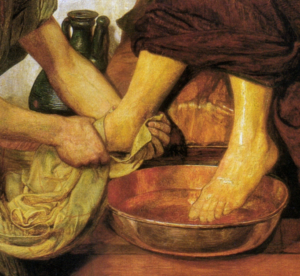In our consumeristic society, when we say “service”, it usually means a transaction. We obtain service from those who serve us in return for consideration. But Service as a spiritual discipline is not a transaction. It is an action carried out in response to God’s command and Jesus’s example.
The oft quoted example when Jesus washed the feet of his disciples gives us important lessons on Service (John 13:1-20). Jesus had gathered the disciples for their last supper together. Feet washing for the guests was a job usually done by the lowest tier of servants. But there were no servants around that day, and nobody was willing to do it. So, Jesus used the occasion to teach the disciples how to serve each other with humility.

By washing his disciples’ feet, Jesus shows us that Service is not segregated into roles of higher or lower status. Jesus was their teacher, but he did not see washing their feet as a job beneath his status. He had said that “whoever would be great among you must be your servant, and whoever would be first among you must be your slave” (Matt 20:26-27). No matter who we are and what our status is in society, we should serve where we are needed, not because we think “the job fits my profile.”
By his example, Jesus also shows us that Service is not a choice. Servants in the time of Jesus were usually slaves. They cannot choose what they do. Whatever work assigned by the master must be done. After washing their feet, Jesus gave the disciples a gentle rebuke, saying “If I then, your Lord and Teacher, have washed your feet, you also ought to wash one another’s feet” (John 13:14). The disciples ought to have washed each other’s feet without waiting for Jesus. We too must not see Service as a choice. When there is work to be done, just do it. We do not choose the time and place of service; God does. He puts us where he wants to and makes us see the needs of people that others may not have noticed. Our role is to act and serve willingly.
On the other hand, Peter was not willing to serve, and also not willing to be served. When Jesus warned Peter that “if I do not wash you, you have no share with me,” he replied “Lord, not my feet only but also my hands and my head!” (John 13:8-9)To ensure he has maximum share in Jesus, Peter requested to be washed from head to toe! Evidently Peter had not understood what Jesus was doing, and he was only thinking about feet washing as a transaction. By his example, Jesus shows us that regardless of who we think we are, a leader or otherwise, we must not only serve, but also be willing to accept service. Accepting service is an act of humility, admitting that we cannot do everything ourselves.
After washing the disciples’ feet and explaining his actions, Jesus said “if you know these things, blessed are you if you do them” (John 13:17). As Paul says, when we are doing the work of our Lord, our labour is not in vain (1 Cor 15:58). God sees our work when we serve others. God will bless us as we practice the discipline of Service.
